Act I
Until recently, the universe shook from the fighting between the gods, giants and Nibelungs in the struggle for the Rhine’s fateful legacy. Now that the storms and disquiet have passed, the earth has become still; everything is peaceful, awaiting the coming of great new events…The dwarf Nibelung gnome Mime, a blacksmith, lives in a cave deep in a dense forest with Siegfried, his pupil. The blacksmith is unable to make sword that does not break into pieces as soon as Siegfried tries it out. Mime calls Siegfried his son, but Siegfried does not believe him, and hates his cowardly, ever-complaining teacher. Reluctantly, Mime tells Siegfried the secret of his birth: one day he found a woman in the woods, exhausted – it was Sieglinde. She herself died giving birth to her son. Before her death, Sieglinde named her son and bequeathed him the splintered fragments of the sword Nothung, which belonged to her murdered husband. To this day, Mime has kept the remains of the sword. Siegfried insists that the Nibelung weld Nothung whole for him immediately. But Mime knows that such a task is beyond him.
A Wanderer appears – it is Wotan himself. He asks Mime for shelter, but is driven out. The Wanderer proposes a wager: whoever can answer three questions wins; the other will forfeit his head. Mime thinks up difficult questions – about Nibelungs, giants and the gods. The Wanderer is able to answer these questions with ease before posing his own three questions. He asks about the race to which Wotan brought woe.
“The race of the Wälsungs,” answers Mime. “Sieglinde and Siegmund, Wotan’s children, loved one another. They had a son, Siegfried – the strongest of the strong.” The second question comes: “Siegfried was raised by a dwarf in order to gain treasure. What sword can complete this feat?” “Nothung,” replies Mime, “Wotan himself plunged that sword into a tree trunk. Siegfried alone can draw it out, but Wotan has smashed his sword.” Wotan asks his last question: “Who will be the one to weld the sword together again?” Mime does not know what to reply. Wotan then answers the question himself: only he who knows no fear can forge the sword. The Wanderer disappears with these words.
Struck with terror, Mime recollects that he has forgotten to teach Siegfried fear, so Mime’s life belongs to the youth. The Nibelung attempts to inculcate fear in Siegfried and tells him that as his mother lay dying, she asked Mime not to send her son forth into the world until he has known the meaning of fear. Siegfried agrees to discover this new emotion. But none of Mime’s stories make the slightest impression on him. Mime promises to take Siegfried to the dragon’s cave. But Siegfried needs the sword and he repairs Nothung himself from the broken shards. Mime then decides to kill Siegfried after his battle with the dragon and seize the treasure.
Act II
That night, in a thicket in the forest by the entrance to the cave, Alberich meets the Wanderer. The hoard of gold and the Ring that will give unlimited power over the world lie inside the cave. Wotan, the supreme god, had cheated Alberich of the treasure and gave it to the giants in exchange for their building the impregnable fortress of Valhalla. Fafner, one of the giants, killed his brother, transformed himself into a dragon and now guards the treasure in the cave. The Nibelung is powerless before the dragon and Wotan must observe the agreements they made. If Alberich ever has the Ring again, he will destroy Valhalla and make the world bend at his knee. “Mime himself has the same dream,” Wotan warns Alberich. The worried Alberich foretells the death of the gods.
Mime brings Siegfried to the dragon’s cave – here the hero will discover the meaning of fear. Tired by the long journey, Siegfried lies down to sleep. He dreams of his father and mother. The forest stirs, the birds begin to sing, and Siegfried calls back to them with his silver horn. Woken by the noise, the dragon creeps out of cave. Siegfried is not afraid of the monster and slays it. Before he dies, Fafner warns his victor: whoever put him up to this deed wishes to kill him. A drop of the dragon’s hot blood falls on Siegfried’s arm. He automatically licks the blood and is instantly able to comprehend what the birds are saying. They tell him secret power of the Ring and the helmet hidden in the cave. Of all the treasures that lie there, Siegfried must take only these two things. Siegfried hides in the cave.
Mime and Alberich appear. They are arguing over who now owns the treasure. The perfidious Mime intends to dispose of Siegfried, but now Siegfried can read the secret thoughts of men and he kills Mime. Alberich hides in the thicket.
The Woodbird tells Siegfried that the beautiful Brünnhilde lies asleep on a high mountain surrounded by flames. Only he who knows no fear will be able to pass through the fire. Brünnhilde will be Siegfried’s and the Woodbird will show him the way to her.
Act III
One stormy, thunderous night, Wotan calls Erda, Goddess of Fate, from the depths of the earth in order to know what the future holds. When she bore Wotan’s child Brünnhilde, however, she lost her prophetic gift: Mother Earth’s material wisdom passed to her daughter. However, Brünnhilde is unable to answer Wotan either, since he renounced his daughter when she opposed his will. And now the supreme god must freely surrender his rule over the world: a young hero is coming, fearless and free from the power of the gods. With the Ring of the Nibelung, the value of which he does not know, he will free the earth from the curse of the gold.
Day breaks. The storm has passed. Siegfried appears in the distance. Wotan tries to prevent the young hero from passing, blocking his path with his spear – the very spear that once shattered Nothung. This time, however, it is the spear which shatters into pieces. Wotan disappears.
The fiery wall parts before Siegfried and, at the top of crag, he sees a sleeping warrior clad in his armour. Siegfried removes the helmet and rips apart the armour with his sword – a beautiful girl lies before him. He is seized by an unknown feeling – could it be fear? He kisses her. The spell is broken and Brünnhilde awakes to new life and worldly love.
Act 1
Scene 1
A cave in rocks in the forest. An orchestral introduction includes references to leitmotifs including themes relating to the original hoard plundered by the Nibelung Alberich, and one in B-flat minor associated with the Nibelungs themselves. As the curtain rises, Alberich's brother, the dwarf Mime, is forging a sword. Mime is plotting to obtain the ring of power originally created by his brother Alberich. He has raised the human boy Siegfried as a foster child, to kill Fafner, who obtained the ring and other treasures in the opera Das Rheingold and has since transformed himself from a giant to a dragon. Mime needs a sword for Siegfried to use, but the youth has contemptuously broken every sword Mime has made. Siegfried returns from his wanderings in the forest with a wild bear in tow, and immediately breaks the new sword. After a whining speech by Mime about ingratitude, and how Mime has brought him up from a mewling infant ("Als zullendes Kind"), Siegfried senses why he keeps coming back to Mime although he despises him: he wants to know his parentage. Mime is forced to explain that he encountered Siegfried's mother, Sieglinde when she was in labor; she died giving birth to Siegfried. He shows Siegfried the broken pieces of the sword Nothung, which she had left in his custody. Siegfried orders him to reforge the sword; Mime, however, is unable to accomplish this. Siegfried departs, leaving Mime in despair.
Scene 2
An old man (Wotan in disguise) arrives at the door and introduces himself as the Wanderer. In return for the hospitality due a guest, he wagers his head on answering any three questions Mime may ask. The dwarf asks the Wanderer to name the races that live beneath the ground, on the earth, and in the skies. These are the Nibelung, the Giants, and the Gods, as the Wanderer answers correctly. The Wanderer then induces Mime to wager his own head on three further riddles: the race most beloved of Wotan, but most harshly treated; the name of the sword that can destroy Fafner; and the person who can repair the sword. Mime answers the first two questions: the Wälsungs (Siegmund and Sieglinde whose tale is told in the opera Die Walküre) and the sword Nothung. Mime has no problem with the first two questions, but cannot answer the last one. Wotan spares Mime, telling him that only "he who does not know fear" can reforge Nothung, and leaves Mime's head forfeit to that person.
Scene 3
Mime despairs as he imagines the ferocity of the dragon Fafner, while "the orchestra paints a dazzling picture of flickering lights and roaring flames". Siegfried returns and is annoyed by Mime's lack of progress. Mime realizes that Siegfried is "the one who does not know fear" and that unless he can instill fear in him, Siegfried will kill him as the Wanderer foretold. He tells Siegfried that fear is an essential craft; Siegfried is eager to learn it, and Mime promises to teach him by taking him to Fafner. Since Mime was unable to forge Nothung, Siegfried decides to do it himself. He succeeds by shredding the metal, melting it, and casting it anew. In the meantime, Mime brews a poisoned drink to offer Siegfried after the youth has defeated the dragon. After he finishes forging the sword, Siegfried demonstrates its strength by chopping the anvil in half with it.
Act 2
Scene 1
Deep in the forest. The Wanderer arrives at the entrance to Fafner's cave, where Alberich is keeping vigil. The two enemies recognize each other. Alberich boasts of his plans to regain the ring and rule the world. Wotan states that he does not intend to interfere, only to observe. He even offers to awaken the dragon so that Alberich can bargain with him. Alberich warns the dragon that a hero is coming to kill him, and offers to prevent the fight in exchange for the ring. Fafner dismisses the threat, declines Alberich's offer, and returns to sleep. Wotan leaves and Alberich withdraws, muttering threats.
Scene 2
At daybreak, Siegfried and Mime arrive. After assuring Siegfried that the dragon will teach him what fear is, Mime withdraws. As Siegfried waits for the dragon to appear, he hears a woodbird singing. He attempts to mimic the bird's song using a reed pipe, but is unsuccessful. He then plays a tune on his horn, which brings Fafner out of his cave. After a short exchange, they fight; Siegfried stabs Fafner in the heart with Nothung. In his last moments, Fafner learns Siegfried's name, and tells him to beware of treachery. When Siegfried withdraws his sword from Fafner's body, his hands are burned by the dragon's blood and he puts his finger in his mouth. On tasting the blood, he finds that he can understand the woodbird's song. Following its instructions, he takes the ring and the magic helmet Tarnhelm from Fafner's hoard.
Scene 3
Outside the cave, Alberich and Mime quarrel over the treasure. Alberich hides as Siegfried comes out of the cave. Siegfried complains to Mime that he has still not learned the meaning of fear. Mime offers him the poisoned drink; however, the magic power of the dragon's blood allows Siegfried to read Mime's treacherous thoughts, and he stabs him to death. He throws Mime's body into the treasure cave and places Fafner's body in the cave entrance to block it. The woodbird now sings of a woman sleeping on a rock surrounded by magic fire. Siegfried, wondering if he can learn fear from this woman, follows the bird towards the rock.
Act 3
Scene 1
At the foot of Brünnhilde's rock. The Wanderer summons Erda, the earth goddess. Erda, appearing confused, is unable to offer any advice. Wotan informs her that he no longer fears the end of the gods; indeed, it is his desire. His heritage will be left to Siegfried the Wälsung, and Brünnhilde (Erda's and Wotan's child), who will "work the deed that redeems the World." Dismissed, Erda sinks back into the earth.
Scene 2
Siegfried arrives, and the Wanderer questions the youth. Siegfried, who does not recognize his grandfather, answers insolently and starts down the path toward Brünnhilde's rock. The Wanderer blocks his path, but Siegfried mocks him, laughing at his floppy hat and his missing eye, and breaks his spear (the symbol of Wotan's authority) with a blow from Nothung. Wotan calmly gathers up the pieces and vanishes.
Scene 3
Siegfried passes through the ring of fire, emerging on Brünnhilde's rock. At first, he thinks the sleeping armored figure is a man. However, when he removes the armor, he finds a woman beneath. At the sight of the first woman he has ever seen, Siegfried at last experiences fear. In desperation, he kisses Brünnhilde, waking her from her magic sleep. Hesitant at first, Brünnhilde is won over by Siegfried's love, and renounces the world of the gods. Together, they hail "light-bringing love, and laughing death."


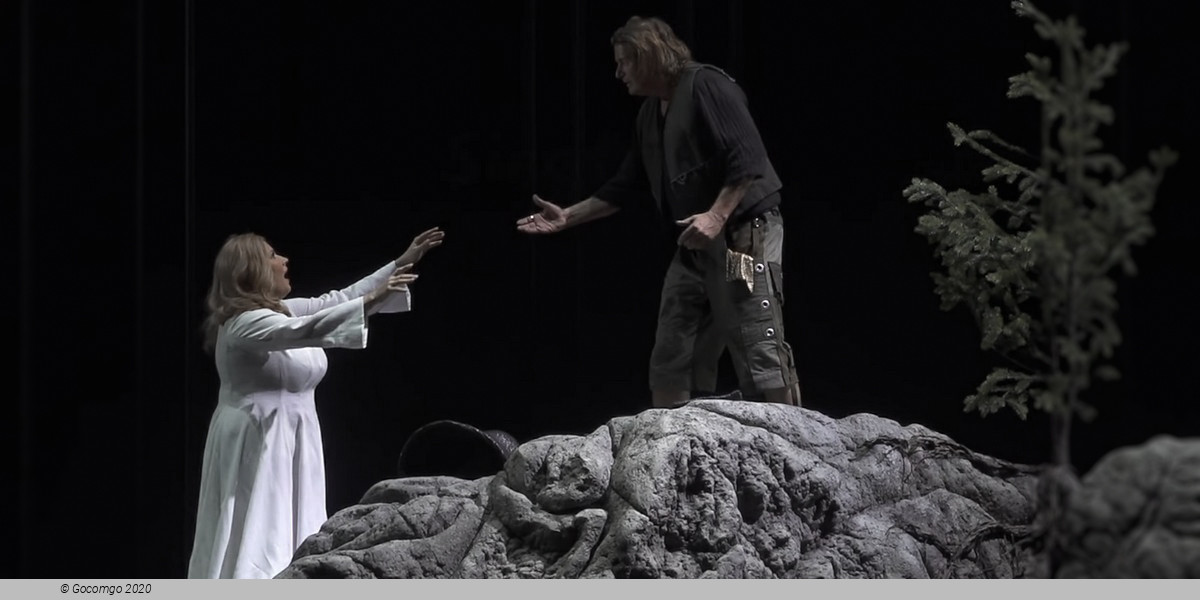
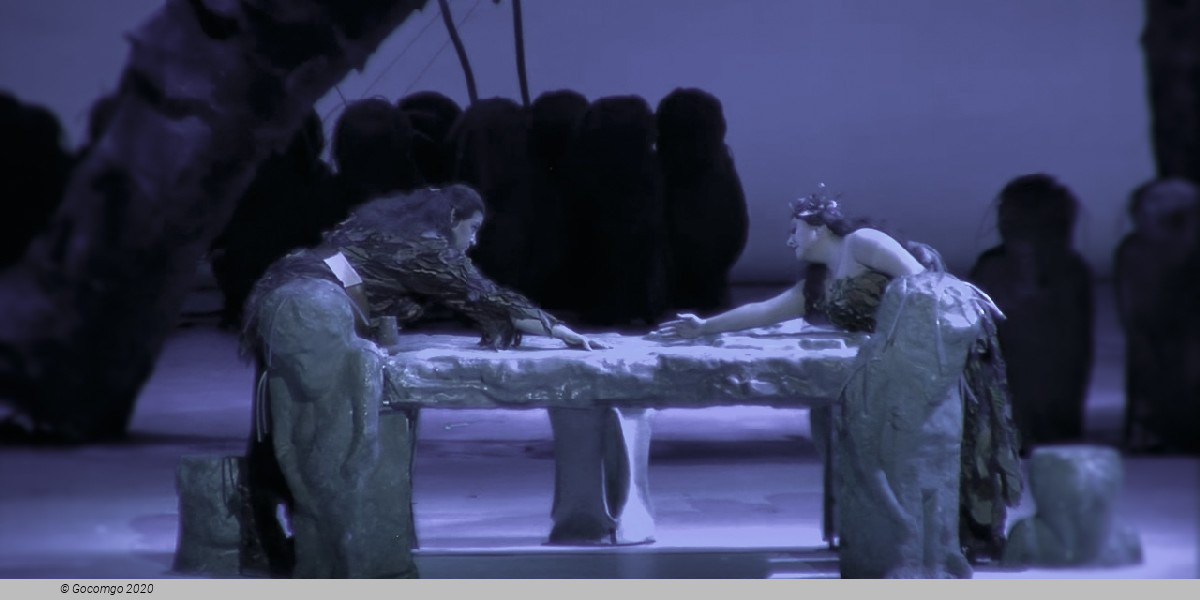
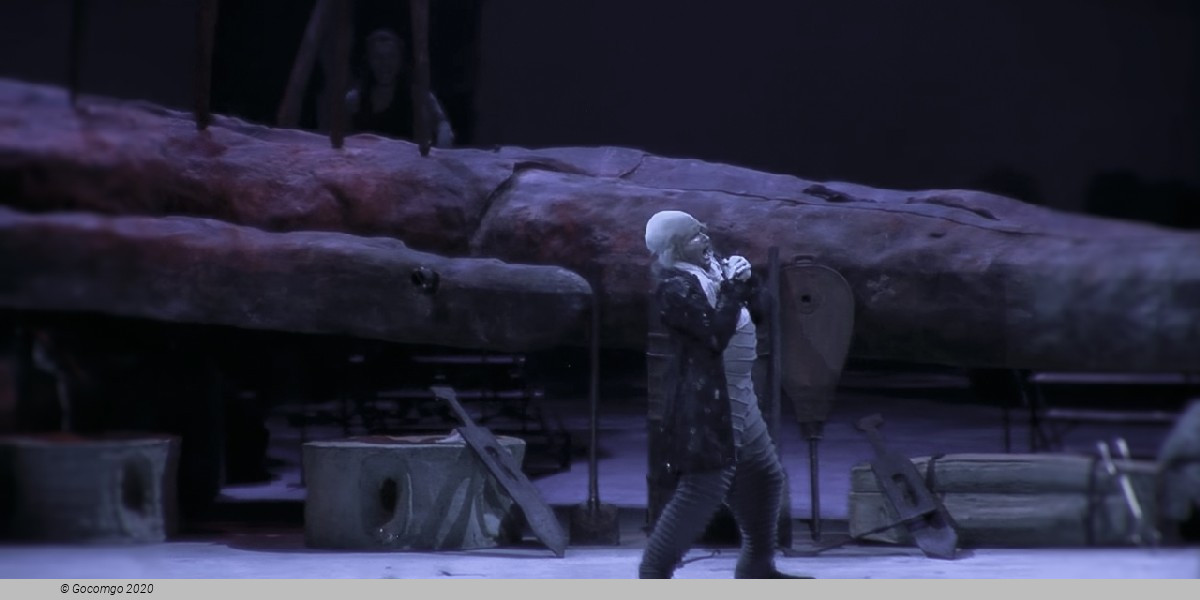
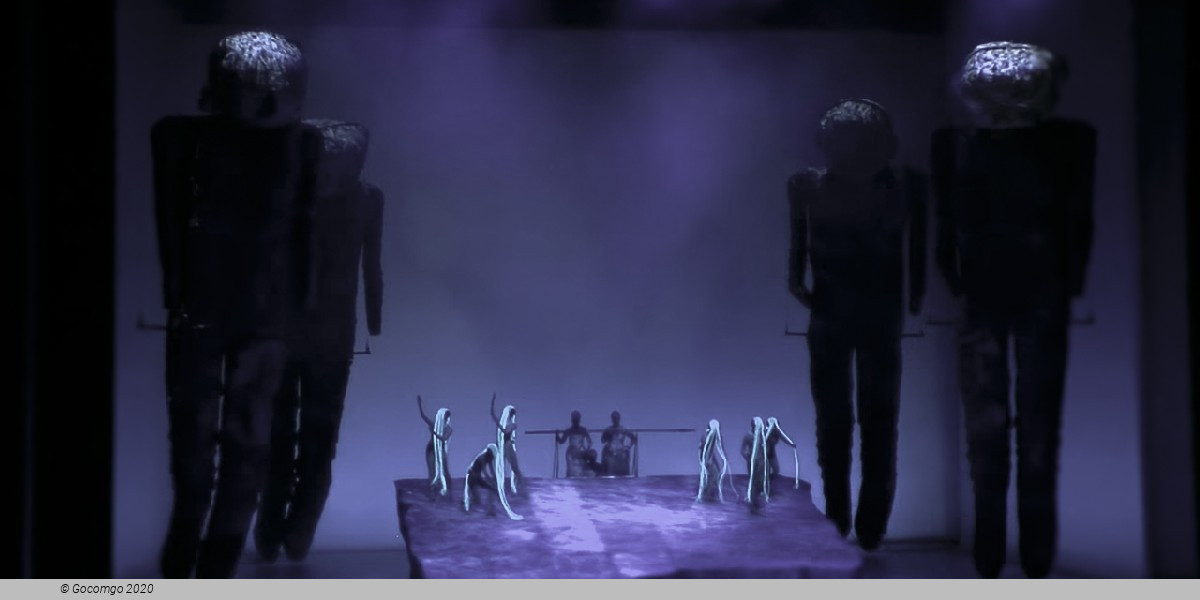
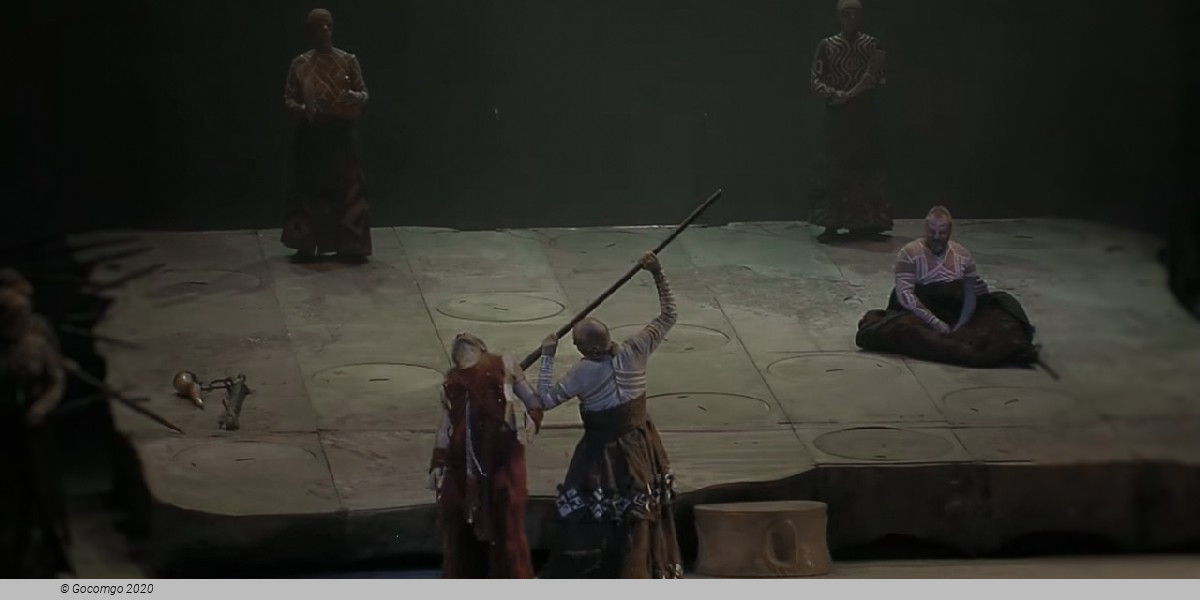
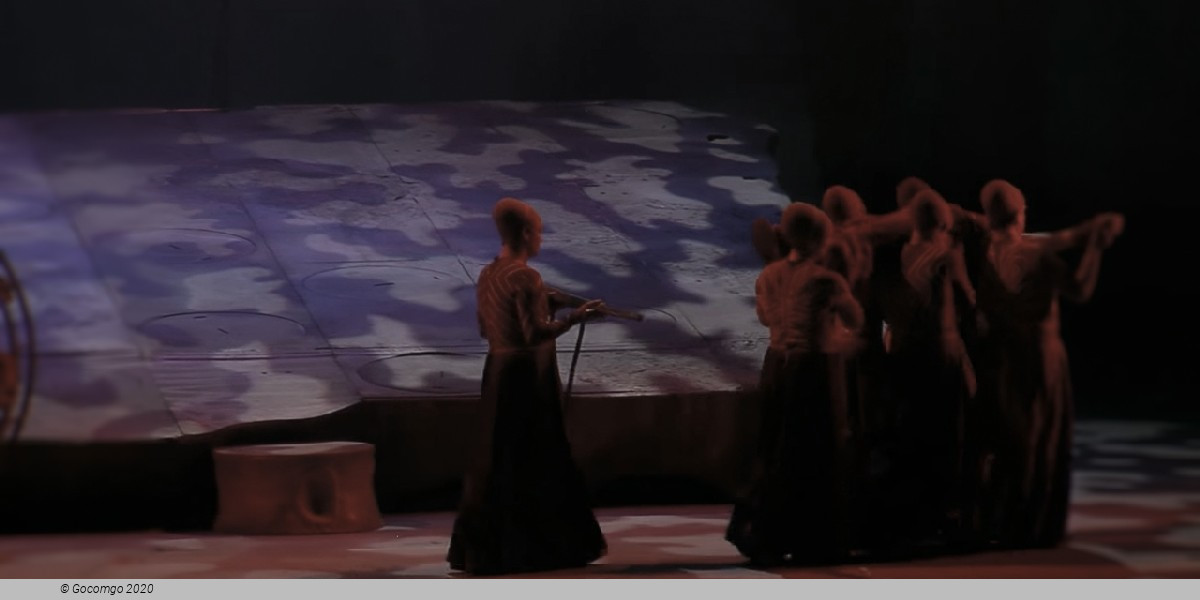
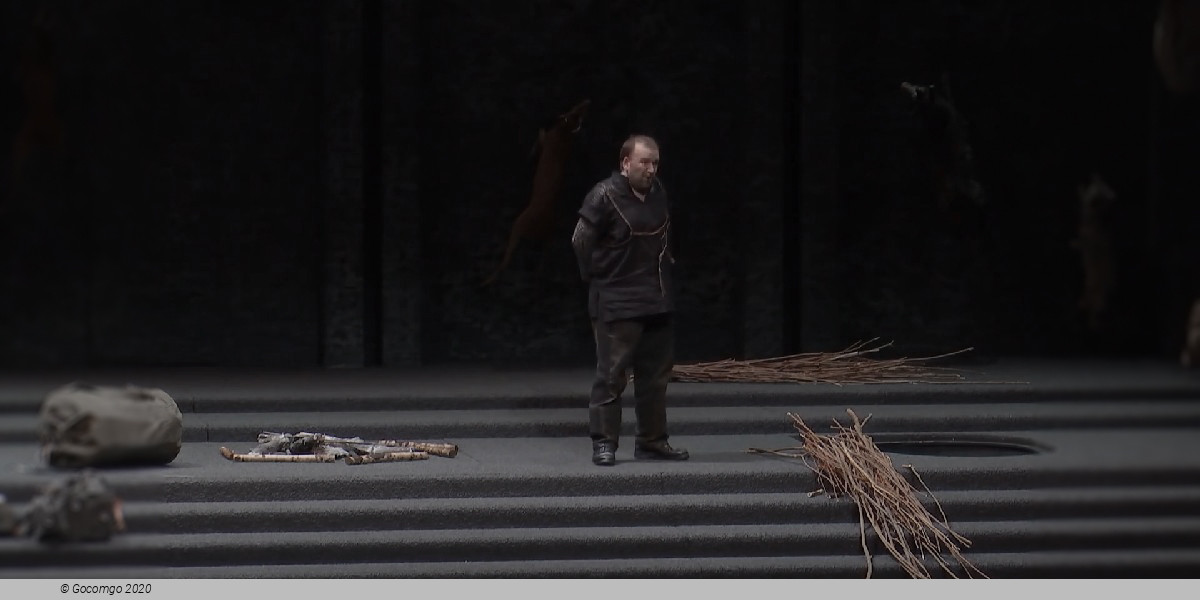
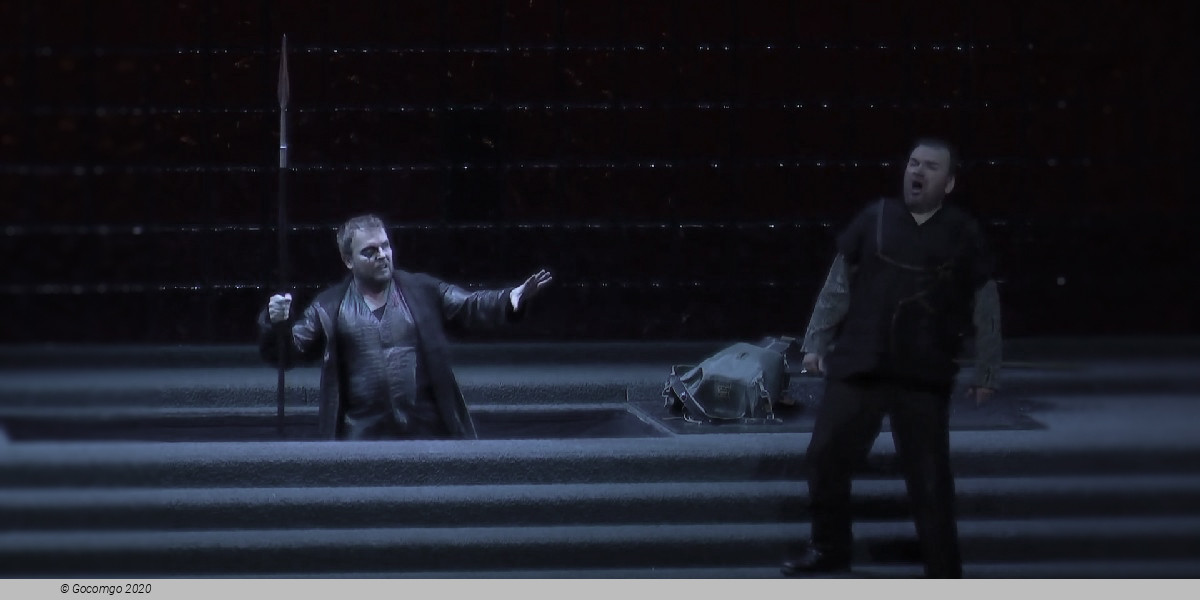
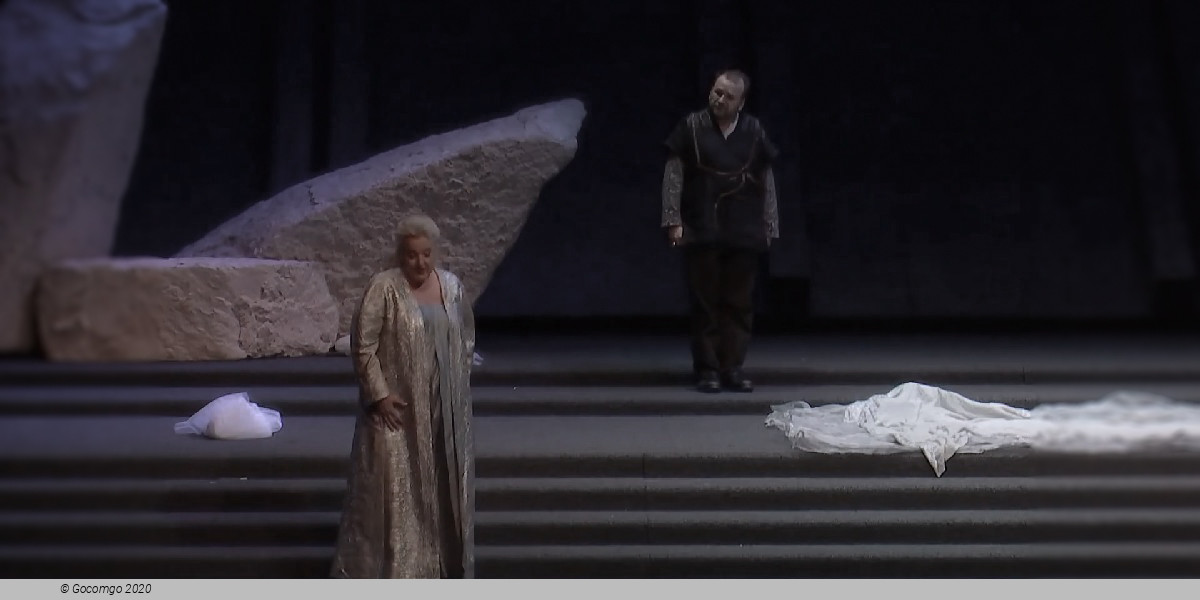
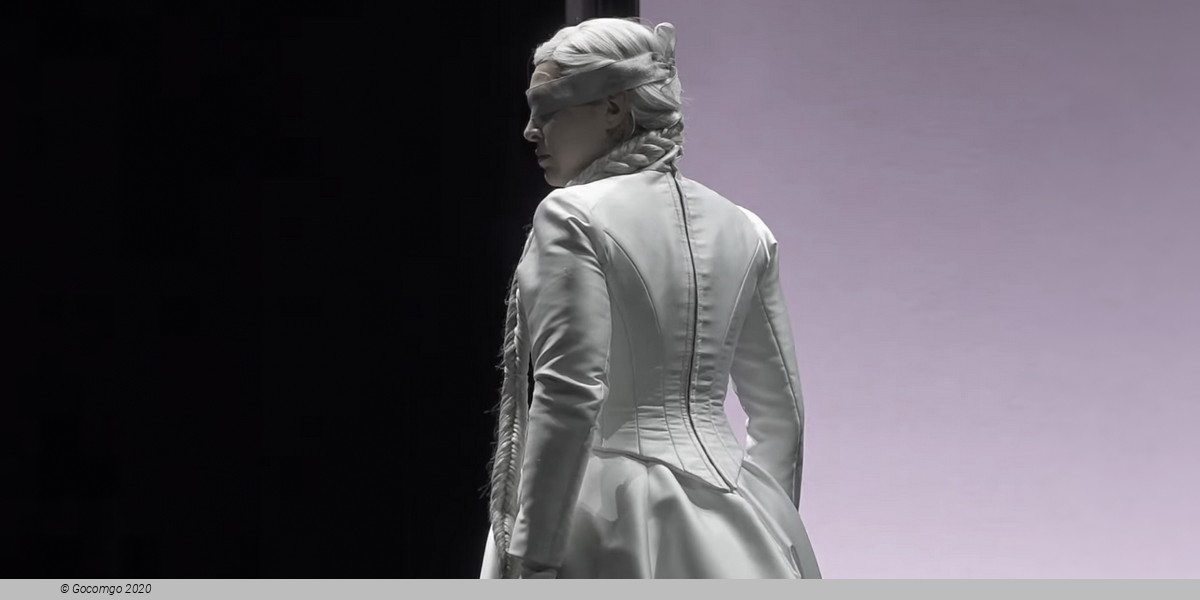
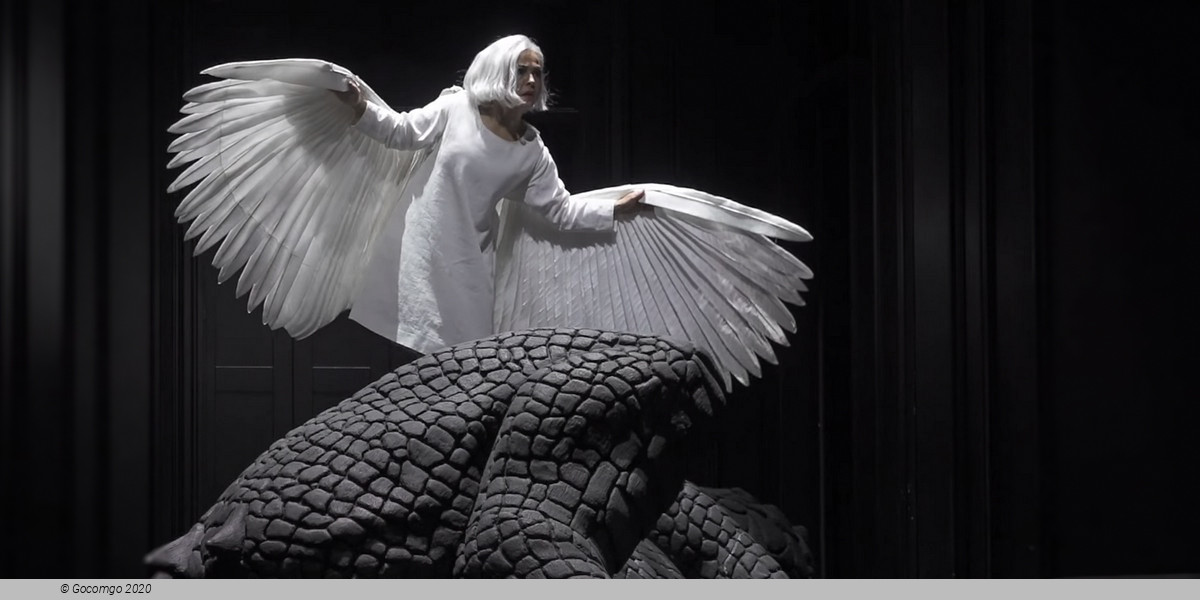
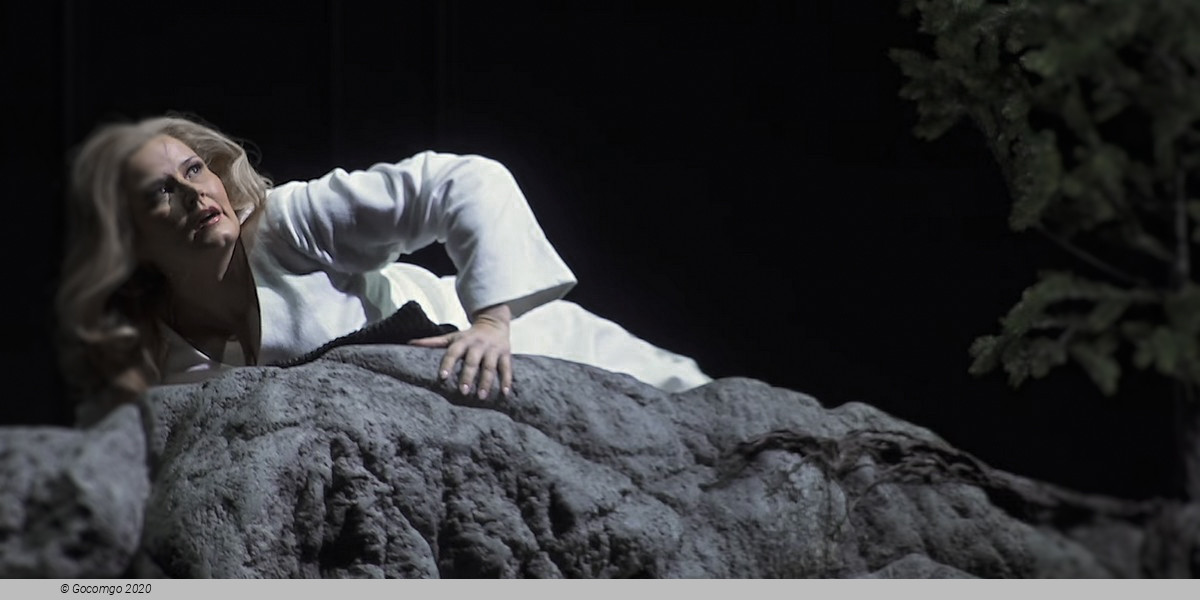
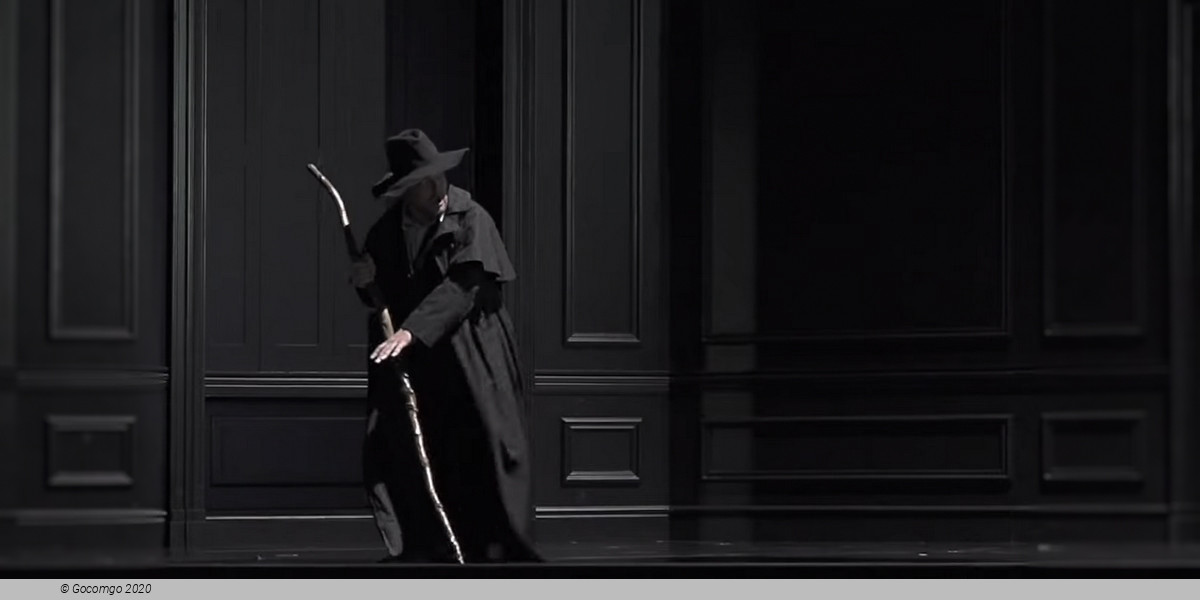
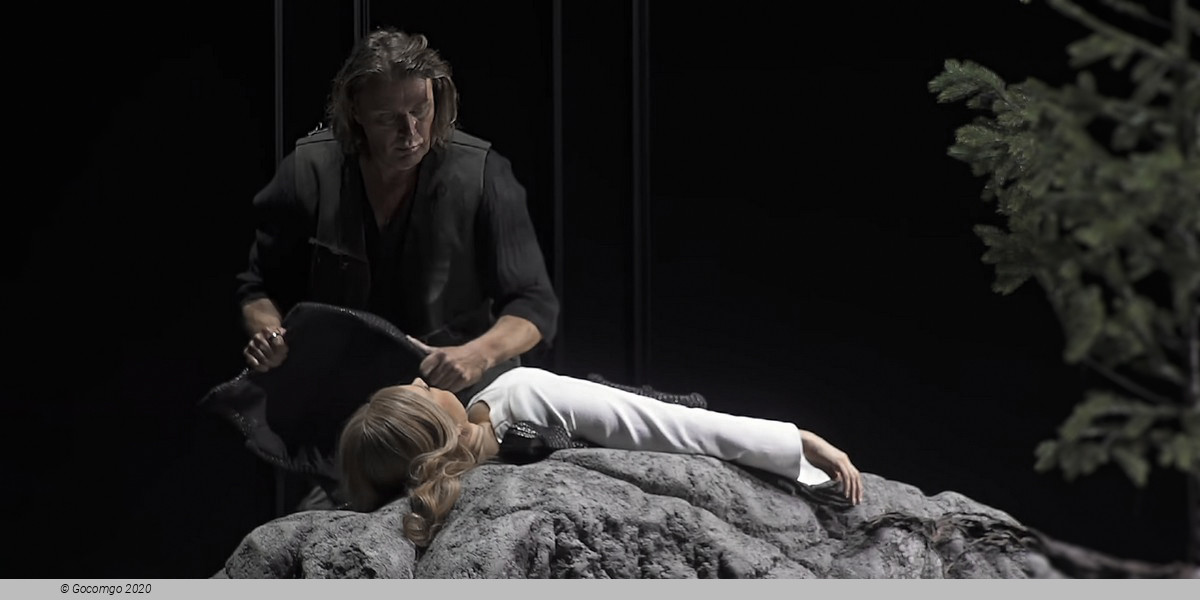
 1 Theatre Square
1 Theatre Square